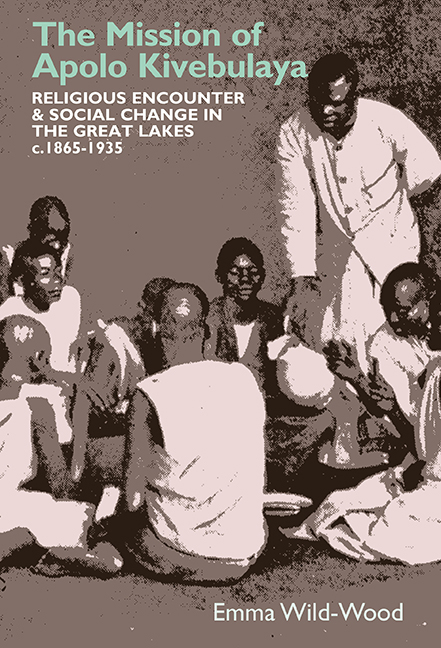Book contents
- Frontmatter
- Dedication
- Contents
- List of Maps and Photographs
- Acknowledgements
- Note on Orthography and Glossary
- Timeline
- Introduction: Kivebulaya and religious change in the Great Lakes
- 1 The afterlife of Saint Canon Apolo (1933 onwards)
- 2 Waswa, a commoner in the Kingdom of Buganda (c.1865–c.1884)
- 3 Munubi, a foot soldier in battle and evangelism (c.1884–1895)
- 4 Itinerant teacher ‘from Europe’ in Toro (1895–1905)
- 5 Clerk in holy orders (1905–1915)
- 6 To all Ituri nations under Belgian rule (1915–1925)
- 7 Reverend Canon Apolo, elder and churchman (1925–1933)
- Conclusion: African missionaries, religious encounter and social change 270
- Sources
- Index
- EASTERN AFRICAN STUDIES
6 - To all Ituri nations under Belgian rule (1915–1925)
Published online by Cambridge University Press: 30 April 2020
- Frontmatter
- Dedication
- Contents
- List of Maps and Photographs
- Acknowledgements
- Note on Orthography and Glossary
- Timeline
- Introduction: Kivebulaya and religious change in the Great Lakes
- 1 The afterlife of Saint Canon Apolo (1933 onwards)
- 2 Waswa, a commoner in the Kingdom of Buganda (c.1865–c.1884)
- 3 Munubi, a foot soldier in battle and evangelism (c.1884–1895)
- 4 Itinerant teacher ‘from Europe’ in Toro (1895–1905)
- 5 Clerk in holy orders (1905–1915)
- 6 To all Ituri nations under Belgian rule (1915–1925)
- 7 Reverend Canon Apolo, elder and churchman (1925–1933)
- Conclusion: African missionaries, religious encounter and social change 270
- Sources
- Index
- EASTERN AFRICAN STUDIES
Summary
Introduction
‘Apolo left that good place of Butiti and went to live in that horrible place of Mboga for the sake of his work,’ wrote Aberi Balya as he explained the admiration in which Kivebulaya came to be held. ‘He was like Moses as you read in Hebrews 11:24–25,’ Balya continued. ‘Apolo was gifted in many things. He had a gift of choosing difficult jobs and difficult places, which other people could not manage.’ Hebrews 11 is a litany of faithful action by characters in the Old Testament. With its frequent refrain ‘by faith…’ it was one of Kivebulaya's favourite passages. In mentioning it, Balya was also placing Kivebulaya in a biblical list of those to be emulated. This chapter examines Kivebulaya's work in Ituri from 1915. In October 1915 the Native Anglican Church synod granted sabbatical leave to Kivebulaya in Buganda for the year of 1916 from where he intended to visit churches around Uganda to mark his twenty years of service in Toro. In December 1915 Kivebulaya left Butiti, where he was working, but went instead to Mboga. He had wept when he heard that the Mboga church was failing and decided to spend the year's leave supporting the church he had started twenty years previously. In January 1917 he relocated permanently to Mboga. From 1915 until his death in 1933 Kivebulaya resolutely continued his mission westwards, evangelising and planting churches among the Ngiti, Lese, Konjo (Nande), Bwamba (Talinga) and Mbuti peoples, as well as the Runyoro speakers of Mboga (Bahema) in the Ituri district. Having wished to become a ‘naturalised’ Toro citizen he now chose to make his home in Mboga, and he would adopt some of its young people as his children. The decision to forego a sabbatical increased the admiration of CMS missionaries and Ganda Christians alike. They followed with interest Kivebulaya's itineration in the Ituri forest and his engagement with forest peoples.
This chapter shows how Kivebulaya developed his missionary techniques in Ituri and how he restaged Ganda and missionary ideals in a new colonial context. In deciding to work in Congo, Kivebulaya demonstrated his belief in a borderless Kingdom of God that was to be spread regardless of temporal power. At the same time, he could not relinquish the Protestant, Baganda and British influences that had shaped him and his cosmopolitan form of international Christian sociality.
- Type
- Chapter
- Information
- The Mission of Apolo KivebulayaReligious Encounter & Social Change in the Great Lakes c. 1865–1935, pp. 203 - 236Publisher: Boydell & BrewerPrint publication year: 2020



